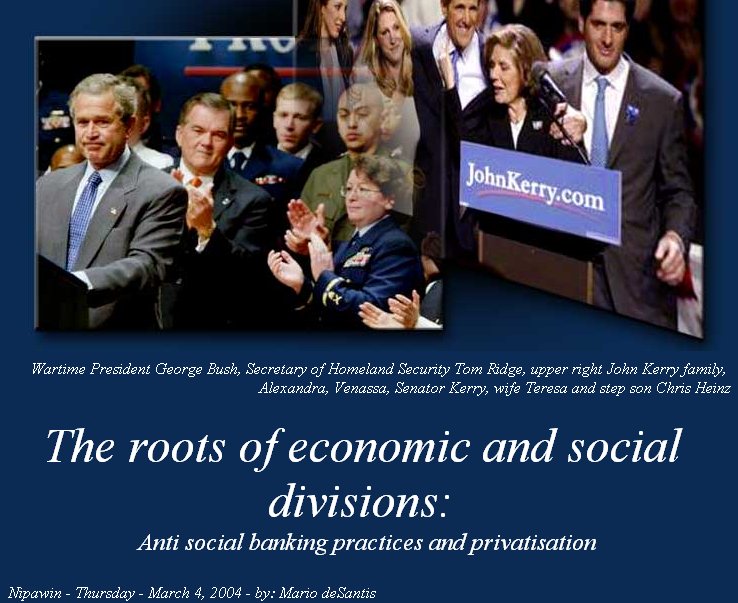Learning Stories
by
Mario deSantis
mariodesantis@hotmail.com
“I am a Canadian, free to speak without fear, free to worship in my own way, free to stand for what I think right, free to oppose what I believe wrong, and free to choose those who shall govern my country.” - -The Rt. Hon. John Diefenbaker, Canadian Bill of Rights, 1960
“The whole judicial system is at issue, it's worth more than one person.”--Serge Kujawa, Saskatchewan Crown Prosecutor, 1991
“The system is not more worth than one person's rights.”--Mario deSantis, 2002
Ensign Stories © Mario deSantis and Ensign
|
|
"Together we will build a strong foundation for growth by repealing the Bush tax cuts for the wealthy to cut the deficit in half in four years and invest in health care and education… The Bush Administration has run the most arrogant, inept, reckless, and ideological foreign policy in modern history."--U.S. Senator John Kerry, March 2, 2004 Banking as a means to provide money and motivate entrepreneurial economic activity is extremely important in a democracy, but banking becomes an instrument of destruction of social and economic fabric when it is used for the exclusive interest of the bankers themselves. As extreme cases of good and bad banking we have the recent experiences of China and Argentina. China has experienced its economic growth along with their domestic overextended loans; Argentina has experienced its economic destruction along with their international overextended loans. Banks create, practically, money out of nothing when they convert the short-term savings of depositors into long-term loans for borrowers. Now imagine the consequences of the international banking system owned principally by the United States (and the richest countries) when they provide international loans to other countries while they are themselves in debt, that is when the United States has negative savings. One reason why the Haitian government of Jean Bertrand Aristide has fallen is because the international financial institutions decided in 2000 to withhold $500US million in development money. Michael Hodges, author of Grandfather Economic Report, wrote
Michael Hodges is possibly right with the above numbers, but American federal spending is not excessive. In fact, the Bush administration’s tax take is now at its lowest level as a share of the economy since 1950. Further, Bush’s privatisation policies support the interests of the Bushes of the world while causing at the same time, increasing trade deficits and therefore more foreign investments. I am of the opinion that the antisocial banking practices and the economic policies of privatisation are the main causes of economic division and violence, at home as well as abroad. On Super Tuesday Election Night, I listened to Senator John Kerry speech and I have a feeling that there is a possibility of change in America and the world. References Pertinent articles published in Ensign John Kerry President Super Tuesday Election Night - Remarks by Senator John Kerry March 2, 2004 http://www.johnkerry.com/pressroom/speeches/spc_2004_0302.html Kroeber, Arthur The real threat to reform January 27, 2004 SCMP, http://www.chinastudygroup.org/newsarchive.php?id=4532 People's Daily Statistical bulletin on 2003 socioeconomic development February 28, 2004 http://www.chinastudygroup.org/newsarchive.php?id=4858 Cibils, Alan Argentina's IMF Agreement: The Dawn of a New Era? October 10, 2003 FPIF, http://www.fpif.org/commentary/2003/0310argdefault.html Korten, David The Post-Corporate World: Life After Capitalism Kumarian Press, 1999. CAPITAL ACCUMULATION: PRODUCTIVE VERSUS EXTRACTIVE INVESTMENT, http://thirdworldtraveler.com/Korten/Naked_Emperor_TPCW.html Niskanen, Miia "Objective Appreciation" to foster understanding of democratic transition in Haiti The Washington Times 1994-2002, http://www.internationalreports.net/special/haiti/ Hodges, Michael Grandfather Economic Report series http://mwhodges.home.att.net/debt.htm Krugman, Paul Maestro of Chutzpah (PDF) March 2, 2004 The New York Times, http://www.nytimes.com/2004/03/02/opinion/02KRUG.html Floyd, Chris Uncle Sugar: For generations, Bush and his ilk have used bloodshed to turn public policy into private gain February 27, 2004 The Moscow Times, http://www.tmtmetropolis.ru/stories/2004/02/27/120.html |
